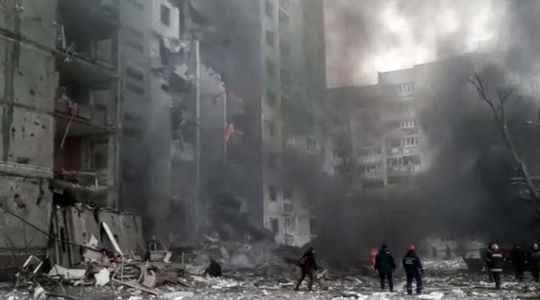From COP to PFUE, from IPCC report to ODD, we believed, for a while, that our history would be written according to the global consensus on the fight against global warming, on lifting millions of people out of poverty, on the ecological transition and the technologies of the future. Objective: align as many nations as possible with these challenges affecting the future of humanity. This was reckoning without the ancestral taste of certain nations for empire and war, for conquest and chariots. Of course, Ukrainian democracy has been widely opposed to the Russian semi-dictatorship, the Ukrainian aspiration to freedom against Putin’s oppression.
But beyond these somewhat obvious oppositions, what the Ukrainians demonstrate is that they are ready to die for their country and freedom. What the Russians demonstrate is that they are willing to die for dominance and power. Also, this war poses to us, French, Europeans, a question that we believed until recently reserved for history books: for what, basically, are we ready to die? The answer, in our latitudes, calls for no obvious answer.
There is no doubt that the erasure of any radical threat, civil peace, abundance – certainly badly shared, but all the same – have dislodged from our minds the immediate feeling of our fragility and of the risk that we would have to take to maintain our lifestyle. This is inscribed in our bodies, unaccustomed to the daily bite of cold and hunger, but also and above all in our minds, all turned towards ideals sometimes societal, sometimes community, sometimes identity, but hardly haunted by this corrosive presentiment that the essential, tomorrow, would be taken away from us.
The reality of a fascism that we did not want to see
We have soaked our minds with a relativism we have called tolerance and lowered our moral hierarchies in favor of those “values” that we talk about so much and define so little. Thus, the war in Ukraine alarms us about the future of the Ukrainian people, makes us tremble for our safety, but, profoundly, must challenge us about our own beliefs, about the very heart of what makes us and holds us, until give our life to it.
“Here appears an imperialist ideology where we recognize our old European demons, making us relive history backwards”
This is why I strongly believe that one cannot make fun of those who, in the present circumstances, try to place themselves on the ground of the mind and of ideas. Admittedly, it will be said that in other times, intellectuals and writers knew how to take up arms to join the international brigades in Spain or the maquis of Vercors. Sure. It may also be that they had more firmly rooted ideals and more grounded courage. To draw the conclusion from this that Ukraine will only be supported with arms pays too little attention to what is deeply ideological in this war. This is perhaps even what shakes us the most.
We have known the din of Islamist ideology, but its logic was distant and disturbing to us in proportion to its opacity. Here appears an imperialist ideology where we recognize our old European demons, making us relive History in reverse. This forces us not only to react physically, concretely, but also to an intellectual jump.
We have awakened from our complacency and our half-measures. We are suddenly brought back in a vital way to the dark realities of a fascism that we did not want to see or not qualify, of a murderous totalitarianism for which we found excuses, of a form of tyranny that we considered acceptable in the others when our past greatness was to accept it neither at home nor elsewhere. It is from this intellectual slumber that we are also awakened.
This is why one should not be ashamed of coming together to speak and testify, as Bernard-Henri Lévy recently did in a packed Antoine Theater, to commune in the gestures that are certainly worn out but in short essential of the demonstration, of petitioning, writing and reflection, reforming in words and speeches the substance of what unites us and drives us, which we have allowed to be diluted too much in the comfort of days. The sentences, of course, pass for being what cowards are left with in the face of barbarism. On the contrary, I believe that barbarism strikes more easily those who are deprived of words and sentences, and assassinates more easily in silence.
